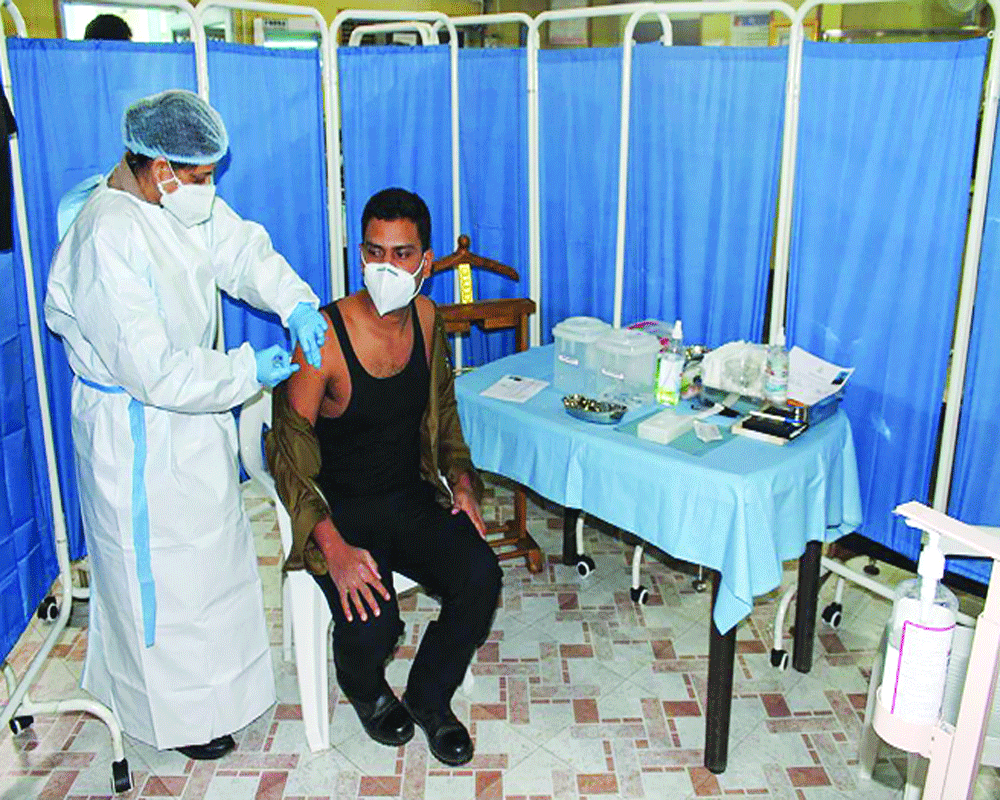Results based on immunisation with Pfizer and AstraZeneca jabs
Indicating that a booster dose is going to be the next in-thing after two mandatory jabs against Covid-19, a study published in The Lancet journal has found that the total antibody levels start to weaken just six weeks after both doses of immunisation with Pfizer and AstraZeneca vaccines. The antibody levels may also be reduced by more than 50 per cent over 10 weeks or 2-3 months, said researchers from University College London (UCL) in the UK.
They said if the antibody levels carry on dropping at this rate, there are concerns that the protective effects of the vaccines may also begin to wear off, particularly against new variants. But how soon that might happen cannot be predicted yet, they added.
The UCL Virus Watch study also found that antibody levels are substantially higher following two doses of the Pfizer vaccine compared to two shots of the AstraZeneca jab, known as Covishield in India. Antibody levels were also much higher in vaccinated people than in those with prior SARS-CoV-2 infection, they said.
“The levels of antibody following both doses of either the AstraZeneca or Pfizer vaccines were initially very high, which is likely to be an important part of why they are so protective against
severe Covid-19,” said Madhumita Shrotri from UCL Institute of Health Informatics in a statement.
“However, we found these levels dropped substantially over the course of two
to three months,” Madhumita Shotri added. Based on data from more than 600 people aged 18 and above, the findings of the study were consistent across all groups of people, regardless of age, chronic illnesses or sex, researchers said.
The authors highlighted that although the clinical implications of waning antibody levels are not yet clear, some decline was expected and current research shows that vaccines remain effective against severe disease.
For Pfizer, antibody levels declined from a median of 7,506 units per millilitre (U/mL) at 2141 days, to 3320 U/mL on 70 or more days.
For the AstraZeneca vaccine, antibody levels were reduced from a median of 1201 U/mL at 020 days to 190 U/mL at 70 or more days, over a five-fold reduction.
“When we are thinking about who should be prioritised for booster doses, our data suggests that those vaccinated earliest, particularly with the AstraZeneca vaccine, are likely to now have the lowest antibody levels,” said Professor Rob Aldridge from UCL Institute of Health Informatics.
The researchers said that the findings also supported recommendations that adults who are clinically vulnerable, those aged 70 years or over, and all residents of care homes for older adults should be prioritised for booster doses.
“Those who were vaccinated with the AstraZeneca vaccine are likely to have much lower antibody levels than those vaccinated with the Pfizer vaccine. This may also need to be considered when deciding who should be prioritised when boosters are rolled out,” Rob Aldridge said in the statement.
While acknowledging certain limitations in the data, including a small sample size for some groups, the authors observed that each individual only contributed one sample, due to which it is impossible to confirm how quickly antibody levels drop for each individual, or whether these would continue to drop or reach a stable level over the next few months.
“Different people will have different levels of immunity depending on the virus neutralising ability of their antibodies as well as their T-cell responses. Even when measurable antibody levels are low, there is likely to be continuing immune memory that could offer long-term protection,” they said.
In order to establish if there is an antibody level threshold needed for protection against severe disease, a further need for research is important, the researchers noted.


























